Monterey Symposium Alumni Spotlight
Stories from the Monterey Summer Symposium on Russia community.
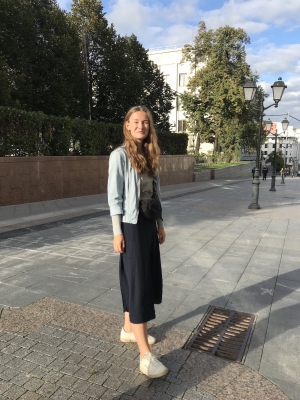
The Balancing Act: Sophie Jaeger on Systemic Opposition in Russia
by Mollie Messick
Monterey Symposium 2021 fellow Sophie Jaeger came to Russian language and culture through a love of music.
Tchaikovsky symphonies could often be heard in Sophie’s home while she was growing up in Austria, and her family regularly took in Swan Lake and the Nutcracker during the winter holidays. In the high school orchestra where she played the violin, she encountered Mussorgsky’s Pictures of an Exhibition and wondered about the pictures Mussorgsky’s music was describing.
Russian wasn’t typically offered as a foreign language in Austrian schools, so Sophie convinced the headmasters of a nearby all-boys Catholic school to allow her to study Russian with the boys. As a result, she was able to immerse herself in Russian history as well, writing two A-level exams for entry into college on the siege of Leningrad and Shostakovich’s seventh symphony.
After graduation, Sophie went to St. Petersburg to work as an au pair and took Russian language classes at Herzen University with exchange students from all over the world. The young children she cared for provided excellent motivation for learning essential words like nelzya (it is forbidden), though she learned to be careful about using diminutive word forms in academic settings.
Sophie returned to Austria to complete a degree in Translation and Interpretation (using her native German, English, and Russian), but her experiences in Russia in 2014 – after the annexation of Crimea and the reality of sanctions hitting the Russian economy – stayed with her. She added a second degree in Political Science in an effort to make sense of Russian patriotism and ideology as she’d experienced it in St. Petersburg and to tie together her interests in Russian history, culture, art, and politics.
“I wanted to understand what I had seen and what I had learned on a different level,” she said.
Sophie traveled regularly to Russia before the pandemic began, and in 2019 she witnessed protests after several candidates for the Moscow City Duma elections were not admitted. Her observations of how systemic political opposition functioned in Russia formed the basis of her master’s research at the University of Oxford, where she will conduct three case studies of protests related to the Liberal Democratic Party (LDPR), the Communist Party, and Just Russia.
Though these opposition parties are generally considered in the West to be Putin’s “lapdogs,” Sophie sees occasional “outbursts of real political energy as we would know it in democratic countries.” When the opposition is suddenly real – operating outside of the Potemkin village of multi-party Russian democracy – Sophie is also interested in how the Russian leadership reacts. “It’s not completely without fear that the regime is looking at these parties,” she said. Putin’s administration needs the opposition parties to retain legitimacy, but there is a nuanced political dance taking place between opposition on paper and opposition that gains a respectable percentage of the vote.
Sophie cited the removal of former Governor of Khabarovsk Krai Sergei Furgal (of LDPR) and the more recent ban on Pavel Grudinin, a Communist Party candidate who received more than 11% when he ran against President Putin in the 2018 presidential election, as examples of the balancing act in which the regime and the systemic opposition parties engage.
Having been educated at European universities where EU-Russia relations were widely discussed, Sophie appreciated the Monterey Summer Symposium on Russia’s focus on the U.S.-Russia relationship, and especially the opportunity Monterey Symposium provided her to engage with two former ambassadors to Russia.
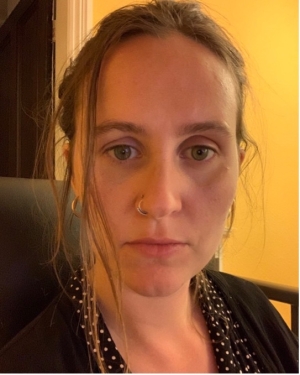
Following Sputnik: Lucy Birge on Russia’s International Media
by Mollie Messick
Monterey Symposium 2021 fellow Lucy Birge committed to Russian Studies after studying abroad in Yaroslavl and St. Petersburg.
Though she studied Russian language before traveling to Russia, her experience in an immersion setting helped her understand how the language worked and how it related to culture and literature.
“[That was] what propelled me into the field and has kept me in it since,” she said of her time in Russia.
Since then, Lucy has earned an MPhil in European Literature and Culture at the University of Cambridge and is working toward a PhD in Russian and East European Studies at the University of Manchester. She has published several articles related to her research on Russia and has taught undergraduate and postgraduate students. As her interest in Russia has deepened and developed, her research has shifted away from literature toward social science.
Lucy’s current research grew out of an opportunity to work with “Reframing Russia,” a project which examines Russia’s international media outlets. Lucy’s focus on the state-run radio broadcast service Sputnik situates her at the crossroads of related but disparate fields such as International Relations, Journalism Studies, Media Studies, and the emerging field of Political Communication.
Through a Western lens, Russia is often seen as harnessing information effectively and using it – sometimes as a literal weapon – against the West. Lucy’s research, however, has demonstrated a lack of coherent, top-down information infrastructure in Russia. Instead, what the state projects is full of contradictions and reflects a general level of disorganization.
“My research tends to be at odds with the official discourse on Russia,” she said, noting that neither Sputnik nor RT, an international television network formerly known as Russia Today, seem to have a strong impact on public opinion. “Russia would love to be able to wield that influence,” Lucy said, but very rarely is able to do so.
Another facet of Lucy’s research involves comparing Russian and English-language output from Sputnik. Sometimes, the differences demonstrate an awareness on the part of the state of the need to address diverse audiences throughout the former Soviet space. For example, news surrounding the anniversary of the 1917 Revolution contained conflicting accounts in Russian, while the English-language version portrayed a more singular story.
It may also be advantageous for Russian leadership to offer multiple narratives in the media. “Why just appeal to one audience? Why come up with single position on something if it will be more politically expedient to question it later? A lot of it is really experimentation,” Lucy said.
For Lucy, who will complete her PhD in December 2021, the Monterey Summer Symposium on Russia encouraged her to consider applications of her research outside of academia. She was impressed by the “bravery” of Russian journalists such as Elena Kostyuchenko as well as the resonance of the entire MSSR curriculum, which helped her to forge connections between presenters, topics, and her own experience.
The topic of climate change, discussed by Dominic Lieven, Anatol Lieven, and former California Governor Jerry Brown, among others, particularly influenced Lucy. She noted that though there are many fierce disagreements between Russia and the West, “there are larger global questions that dwarf all of these schisms.” Pressing issues such as climate change may offer an opportunity for greater geopolitical cooperation, Lucy said.
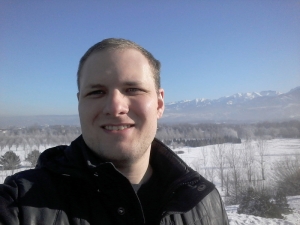
Empires and Education: John C. Stanko on International Relations and the Soft Power of Higher Ed
by Mollie Messick
Monterey Symposium 2021 fellow John C. Stanko chose Russian language class over Japanese in college at Texas Tech because it met later in the day. A few weeks into the class, he was hooked. Now, he is a PhD student in Political Science with a focus on International Relations and Russian Studies at Indiana University.
A first-generation college student, John was homeschooled in New Jersey, where he grew up, and he completed a two-year degree there before transferring to Texas Tech to continue his undergraduate studies. The associate’s degree happened to combine history with political science, and John discovered an abiding interest in empires and politics. At Texas Tech, this interest spread into the field of International Relations, eventually leading him to a master’s program at the University of Kansas in Russian, East European, and Eurasian Studies. One of the benefits of studying Russia and Eurasia is that “you’ll never run out of things to study,” he said.
At Kansas, John researched Russia-China relations in the Russian Far East. His master’s thesis, based on this research, is currently under review for publication with an academic journal. He began to learn Chinese, studying online and then in an intensive course during a summer language program at Indiana University.
John’s love of language learning continues to interact with and shape his academic pursuits. After a course on Central Asia and a trip to Kazakhstan, John joined a language exchange website and began studying the Kazakh language. During the 2021-2022 academic year, he will use a Foreign Language and Area Studies (FLAS) award to conduct more formal study of Kazakh.
Perhaps because his early education primarily took place outside of a formal system, John has always been interested in education and how different countries and institutions approach both academic and civic education. After teaching in Moscow and observing the Russian educational system, this interest intensified, leading him to focus his PhD research on the intersection of international relations and higher education.
John hopes to include Kazakhstan along with China and Russia in his investigation of how authoritarian governments use higher education as soft power to accomplish foreign policy objectives. He is also interested in expanding his research to include other examples of soft power exchanges, such as sporting events and people-to-people connections. All of these are areas where governments can craft outward-facing narratives that don’t require formal foreign policy action.
The 2021 Monterey Summer Symposium on Russia exceeded John’s expectations. He especially enjoyed speaking with experts like Dmitri Trenin and Andrei Tsygankov whose work is prominent in the field of International Relations.
“[G]etting to actually talk to people whose books and materials I’ve read when writing seminar papers” was a highlight of the Symposium, as were the candid and forthcoming responses of experts, John said. He noted that most experts seemed to genuinely enjoy participating in the Monterey Symposium, returning year after year to interact with fellows.
Due to the small number of fellows and the intimate setting of the Monterey Symposium classroom – despite being online again this summer – John had the opportunity to engage with experts and other fellows, deepening his understanding of many facets of Russia and foreign policy. He was able to mention to MSSR expert Dominic Lieven, for example, how much Lieven’s book Empire: The Russian Empire and Its Rivals (2001) had influenced his plan of study as a young scholar. MSSR 2021 fellows also had the privilege of reading the manuscript of Professor Lieven’s forthcoming book.
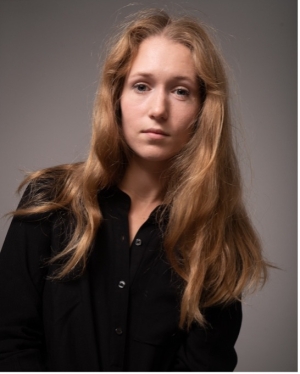
A Russian in Oxford: Nadya Kamenkovich on Looking Back at Russia from the West
by Mollie Messick
Monterey Symposium 2021 fellow Nadya Kamenkovich didn’t plan to go into Russian Studies as a field. Born and raised in Moscow, she studied International Relations at the Higher School of Economics and focused on Spain and Latin America.
After graduation, Nadya interned at the Moscow Carnegie Center and the Russian International Affairs Council and decided she didn’t want to concentrate on Spain and Latin America for the rest of her career. Instead, she switched to a focus on Russia and Eastern Europe and applied to the MPhil program at the University of Oxford, where she has completed the first of two years.
Despite her strong familiarity with Russian perspectives, Nadya has enjoyed learning more about her country of origin from a Western perspective.
“It’s really exciting to view this difference, to understand how other people view the country you were born in,” she said.
In Western academic papers on Russia, Nadya often sees a paragraph or two explaining Russia’s importance as a country – in the Cold War, for example, or in discussions of cooperation with the EU. To someone raised in Russia and in the Russian school system, Nadya learned to take Russia’s importance for granted. “Of course Russia feels like a very important country,” she said. She has also had the opportunity to study Eastern Europe and to acquire more knowledge about countries she’s less familiar with.
One of the benefits of studying Russian and Eastern Europe at Oxford has been the willingness of the faculty to present all sides of an issue. “I was blessed with an academic environment that was trying to be as objective as possible in political and social science,” Nadya commented.
The balanced approach to Russia-related discourse was also something that drew her to the Monterey Summer Symposium on Russia. She spoke with fellow Russian and Monterey Symposium 2020 alumnus Nikita Gryazin about his experience with the Monterey Symposium, and she also received a strong recommendation to apply from Monterey Symposium 2020 alumna Alexandra Diouk. In the end, though many of her classmates at Oxford were excited about the lineup of experts in International Relations, it was the Russian writers in the Monterey Symposium 2021 curriculum that convinced Nadya that the Symposium would be a great fit for her.
As a Russian person in a Western university system, Nadya feels that some topics in the field of International Relations are more sensitive than others. She’s chosen in the Arctic as a topic for her master’s thesis in the hope that it might prove less controversial.
“I really hope that the Arctic can become the area of cooperation between the states where we can work together and tackle climate change,” she added.
By investigating the development of Russian Arctic strategy and the international status of Russia in relation to climate change and Arctic policy, Nadya will add to a growing body of literature in academia – both Russian and Western – that covers everything from development of the Arctic to security concerns and media coverage of the region.
As a young person with broad interests and an optimistic energy, Nadya hopes that studying climate change will extend her expertise beyond the field of Russian Studies and potentially open up more opportunities for traveling and working abroad.
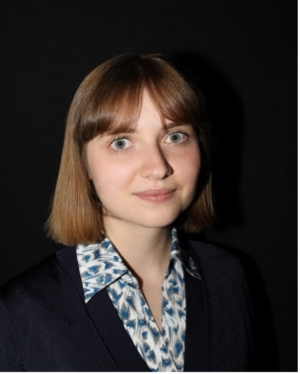
“A Mirror to Russian Society”: Yana Demeshko on Literature, Language, and Youth Movements
by Mollie Messick
When Monterey Symposium 2021 fellow Yana Demeshko moved to California in 2012, people had lots of questions for her about Russia. Spurred by this experience, common to immigrants, Yana embarked on an academic journey that has deepened her knowledge of the languages, literatures, and cultures of central and eastern Europe as well as Russia and central Asia.
Though Yana was born in Russia, she spent her childhood in Bishkek, Kyrgyzstan, where both of her parents were born and raised. By the time she started school, the family had moved to St. Petersburg. Later, Yana completed high school in Canada and enrolled at UCLA. Her family background includes Ukrainian, Uzbek, and German influences as well as Russian, and this diversity – along with her experiences living in multiple countries – has driven her curiosity about how different groups of people interact within and surrounding Russia.
The beginning of her undergraduate studies also coincided with the Bolotnaya protests in Moscow. When a professor mentioned an upcoming conference on Slavic Studies, she dug in, analyzing youth participation in protests and pro-Kremlin youth groups organized by the government.
She found that one reason young people supported Navalny and protested corruption, for example, stemmed from his use of platforms like YouTube. “His approach is very Western,” Yana noted, adding that for other parties in Russia, these avenues would be “unthinkable.” On the other hand, pro-Kremlin youth groups draw on a sense of national pride to open doors for professional opportunities and political appointments.
New anti-LGBTQ laws also took effect in Russia shortly before Yana started college. From LA, she volunteered with the Petersburg-based LGBTQ group “Coming Out” (Vykhod in Russian), translating between Russian and English. As a result, Yana learned more about the experiences of persecuted groups in Russia.
Yana is drawn to situations requiring an understanding of diverse perspectives, as evidenced by her love of war games – simulated international crises in which players use their individual expertise to represent the various decision-makers who would be present in a real crisis. She has participated in war games at Stanford’s Hoover Institution as well as at conferences sponsored by the RAND Corporation and the Georgetown University Wargaming Society. Yana appreciates the way these games move beyond speculation and into the complex dynamics of a real conflict.
“It’s a fascinating experience because you get to call the shots,” she said. She enjoyed the opportunity to engage in a similar program through the Harvard Negotiation Task Force boot camps during the Monterey Summer Symposium on Russia.
Yana’s true passion, however, lies at the intersection of language and literature. Over the course of undergraduate, graduate, and PhD studies at UCLA, Yana has studied Polish, Croatian, Bosnian, and Serbian languages. She also speaks French and some Italian in addition to Russian and English. Her master’s research focused on a cycle of poems by the futurist poet Benedikt Levshits, and her PhD dissertation will likely stay in the twentieth century, covering literature of the Cold War era.
Yana looks at literature as a “mirror to Russian society” that “exposes thinking,” especially the thinking of people from the past. It also allows us to see how the Russian language has evolved and why it is “so easy for us to read Pushkin and understand him, but so difficult to read the literature of those who were alive just 50 years before him,” as Yana explains.
Yana is also a fellow of the Stanford U.S.-Russia Forum (SURF), where she collaborates with other scholars in the Applied History working group. They are currently moving toward publication of a study on the potential for collaboration between Russia and the U.S. on vaccine development through the lens of past cooperation during the Cold War on both smallpox and polio vaccines.
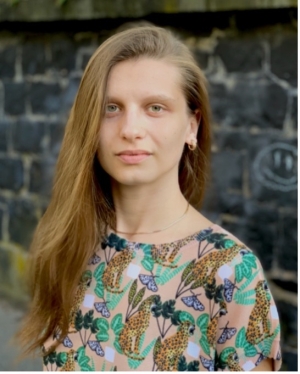
Looking North: Alina Bykova on Svalbard, Environmental History, and the Russian Arctic
by Mollie Messick
Monterey Symposium 2021 fellow Alina Bykova’s interest in the Soviet North, where large cities appeared seemingly overnight – often built with forced labor – began while she was working toward a master’s degree in European and Russian Affairs at the University of Toronto.
Alina has long advocated for issues of human rights and environmental justice. In reviewing Soviet-era environmental devastation, she found that the Far North was home to the most extreme examples. Stranger still was the fact that many industrial cities in the post-Soviet North continue to persist, sometimes even succeeding in economic terms, despite the absence of the centralized Soviet system.
Her research eventually centered on Svalbard, where she studied the Russian settlements of Pyramiden and Barentsburg, trying to understand why it was so important to the Russian government to maintain a presence on Svalbard despite the declining coal industry.
As she moved deeper into Arctic Studies, she also considered the rapidly changing Arctic from a geopolitical standpoint. The region is often discussed in purely geopolitical terms, as world powers “scramble for resources,” but Alina’s focus is on its environmental history, and she prioritizes local knowledge and lived experience over national agendas.
“There’s so much more to this region than just great powers trying to push each other around,” she said.
The Arctic has also become an indicator region for climate change, already experiencing what experts often refer to as the “impending climate catastrophe.” Alina enjoyed hearing from Monterey Symposium experts Governor Jerry Brown and Anatol Lieven during this year’s Symposium, and she agrees with their assertion that the climate emergency will soon eclipse even the most urgent geopolitical threats.
In more recent research for her PhD program in Russian and Eastern European History at Stanford University, Alina partnered with Indigenous activist Pavel Sulyandziga to study and write about the detrimental effects of mining around Norilsk, an Arctic city in the Taimyr region with a population of over 200,000 people. They published an article in the Barents Observer in May of 2021 reflecting on the one-year anniversary of the massive fuel spill in the region. Alina recognizes that, as an outsider, it’s important to listen. Though Pavel is from the Russian Far East, he has years of experience working with Arctic peoples.
“I wanted to make sure that I wasn’t just speaking for people, that I was actually deferring to his [Pavel’s] expertise and his experience, and he was the lead on this project. That’s 100% always the way I want to go about it,” she said. These kinds of partnerships are part of a larger need to make sure the voices of Indigenous people in the Arctic are heard and respected.
“You can’t really talk about the Arctic without talking about Indigenous peoples since they’ve been there for millennia and they’re the original people who are very well aware of what’s happening in the region and have been historically,” she added.
Alina has written two research papers on Norilsk, including one that draws on the memoirs of Norilsk residents and explores the dissonance between the polluted city with a harsh climate and memoirists who claim to have spent their “best years” there. She has also worked with the Stanford Environmental Justice Working Group to promote awareness of mining giant Nornickel’s environmental abuses – and their impact on local Indigenous communities – to clients who might buy Nornickel metals for use in electric car batteries.
In addition to supportive mentors at the University of Toronto and Stanford, Alina has also drawn on her undergraduate degree in journalism and her experience as a journalist at the Toronto Star as she pursues an academic career.
“The ‘who, what, when, where, why,’ all of that is so relevant, and all of that is history,” she said of the connections between history, journalism, and the current issues facing the region.
Alina has several more years of research to complete her PhD, but she knows that her next move will grow out of her commitment to the defense of human rights and the environment.
“Anything I do, I would like it to have some sort of advocacy or educational component that helps people. That’s super important for me as a career goal.”
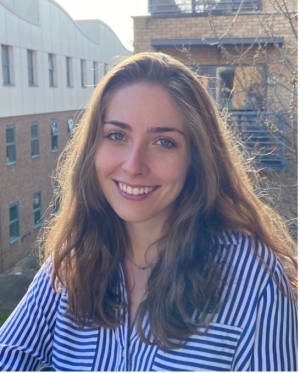
A “Rock-Solid Foundation”: Tina Maglakelidze on Family, Citizenship, and Women in Politics
by Mollie Messick
When the bus carrying the parents of Tina Maglakelidze (MSSR 2021) out of Georgia in 1992 was stopped by Abkhaz soldiers, her Georgian father was detained.
Fighting had broken out in Abkhazia just as her parents arrived there for their honeymoon. Ultimately, it was her father’s Russian passport, along with his position as a surgeon in one of Moscow’s central hospitals, that helped him reunite with Tina’s mother in Sochi.
Tina’s Russo-Georgian family immigrated to the United States from Russia when she was three years old. Though the rest of her family works in medicine, she has pursued an academic path that immerses her in the languages, cultures, and histories of the region her family left nearly twenty years ago. She recently graduated with distinction from the MSc program in Russian and East European Studies at the University of Oxford. In her thesis, she engaged themes of identity, diaspora, citizenship, and passports.
“These things carry so much currency, especially in that region,” she said.
Tina remembers watching CNN with her parents when the Russo-Georgian war started in 2008. Later, when she introduced herself to Madeleine Albright as the daughter of a Russian mother and Georgian father, Albright quipped that it “must have been a fun household in 2008.” Though both of Tina’s parents followed the news intently, there was no tension at home about the war.
“There was a lot of solidarity between the two, there was not this drama that people might want to think,” she said.
Tina’s Russian grandmother, who was born in 1943, also influenced her decision to study politics and international affairs. She still has a letter her grandmother’s brother wrote from the Gulag where he was detained. Out of necessity, her family has always been engaged with the political forces at play in their lives.
“You have to be tapped into politics,” she said. “That trickled down to me.”
Before arriving at Oxford, Tina studied in the School of International Service at American University. Under the mentorship of former Ambassador Sally Shelton-Colby, she created the Female Ambassador Project with two other students in the honors program and interviewed over twenty-five ambassadors.
“I was floored by their honesty and their words of encouragement,” Tina said of the ambassadors’ candid revelations about the challenges women face in diplomatic careers. They also imparted a sense of urgency about increasing the number of women in the field.
Tina remains committed to “empowering women to feel like they can contribute to the dialogue” no matter where they’re located, and she plans to create a similar project with female politicians in Tbilisi, where a Fulbright English Teaching Assistantship will take her in September 2021.
In these and all her pursuits – working for the Atlantic Council, studying Georgian language at Oxford, planning for a career in international affairs – Tina’s heritage and strong family ties remain present.
“That love was always there,” she said of her family. “Any of my success has to be attributed to that – that rock-solid foundation at home.”
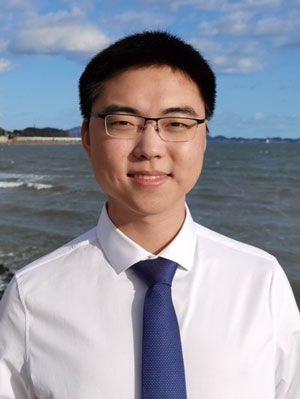
Russian Textbooks and Liberal Democracy: Yanliang Pan on Ideology in International Relations
by Mollie Messick
Monterey Symposium 2021 fellow Yanliang Pan grew up in Beijing before moving to California in 2011 to attend middle school in the U.S. His experiences with both Chinese and American cultures and education systems, as well as with the discrepancies between insider and outsider perspectives on both countries, have framed his research on Russia.
Yanliang began studying Russian independently in high school after a trip to Russia collided with an impression he had formed as a child in China. “Historically between Russia or the Soviet Union and China there has often been a sort of affinity,” he said. As his knowledge of Russian language, culture, and politics has evolved, however, this “almost mythological” concept of Russia has become more nuanced.
Yanliang is a graduate student at Georgetown’s Center for Eurasian, Russian, and East European Studies (CERES), where he studies the role of ideology in international relations, among other interests. After finishing his degree, he plans to work in Russia to deepen his understanding and put what he’s learned about Russia in U.S. institutions into perspective.
Perspective-taking plays a big role in Yanliang’s academic career, particularly in seeking to understand the influences on different levels of political rhetoric. The discourse at Georgetown, for example, is heavily influenced by the school’s location in DC. The portrayals of China in the U.S. don’t always match up with what Yanliang hears from within China: “Sometimes I feel like the China that I hear portrayed in Western media, or that I see or read about, isn’t actually the China I know,” he said.
Many of these mismatched perspectives can be traced to issues of ideology, in Yanliang’s view. Through his research, he aims to challenge the Biden administration’s claim that we are in a “century of competition between democracy and autocracy.” While the West touts liberal democracy, Yanliang doesn’t see a coherent ideological response coming from China or Russia. In other words, there is not a true ideological battle happening between the U.S. and Russia or the U.S. and China.
“Ideology is actually a luxury. It’s what you start to think about when all of your material needs are met and your economy is growing well,” he said. It also serves as an “expedient tool” for political discourse. Though using ideological rhetoric might aid politicians engaged in domestic and international confrontations, Yanliang has found that even patriotic people in Russia and China are not overwhelmingly anti-American or anti-liberal.
This misunderstanding was also evident in Yanliang’s research on Russian textbooks. He found that the books approved for World History courses by an increasingly conservative Russian state espoused many values of liberal democracy as it is understood in the West. The paper resulting from this research, “Ideology and Civilizational Identity in Russia’s State-Approved World History Textbooks,” is forthcoming in Problems of Post-Communism.
Recently, after taking Georgetown professor and Monterey Symposium expert Jill Dougherty’s Russian Youth course, Yanliang’s research interests have turned to youth programs and policy in Russia. Though some of the ideological messages from the government may trickle down to youth, they are fragmented and don’t resemble the coherent propaganda of the Soviet Union.
“I think public opinion is really malleable,” Yanliang said. “If one day the message suddenly changes, I think the public will quickly come around. There is no permanent civilizational or ideological divide across the world.”
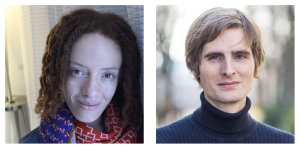
Deep START: MSSR Fellows Participate in Negotiation Boot Camps with Harvard Experts
by Mollie Messick
Monterey Symposium fellows joined fellows from the University Consortium to participate in two negotiation boot camps with the Negotiation Task Force (NTF) of the Davis Center for Russian and Eurasian Studies at Harvard University on July 7-9 and July 13-16.
The first simulation recreated the conflict in eastern Ukraine in 2018, while the second placed fellows in a hypothetical future negotiation of the New START treaty between Russia and the United States. Both exercises were led by NTF Director Dr. Arvid Bell and NTF Associate Taylor Valley (MSSR 2017). The 2021 boot camps mark the third year of collaboration between NTF and MSSR and the first year that MSSR and University Consortium fellows participated jointly.
The NTF team designs and supports these realistic simulations of high-stakes political negotiations, but once fellows have been briefed by Bell and Valley on the scenario and their individual roles – each participant represents a political actor in the negotiation, and each receives an agenda – they are on their own to reach an agreement before the deadline.
“Once the actual negotiations commence, they are in charge. We don’t intervene,” said Bell. After the simulation ends, Bell and Valley lead a debrief involving individual, small group, and plenary feedback. This structure promotes development of the skills that fellows need to succeed in negotiation: critical thinking, leadership, conflict management, and the ability to read nonverbal communication.
The interactive exercise also exposes fellows to a wider range of perspectives than is typically covered in texts and classrooms. In the Ukraine Exercise, fellows represented negotiators from the regions of Donetsk and Luhansk in addition to the expected Russian, Ukrainian, American, EU, and OSCE representatives.
“One thing that MSSR excels at is taking this knowledge as delivered by experts, and this substance, and then pairing it with these skills,” said Valley.
Bell agreed, noting that like MSSR, the NTF programs “help close the knowing-doing gap.”
“MSSR doesn’t just want to educate smart thinkers but also creative doers, and this is where the NTF can help,” he added.
For Valley, a Monterey Symposium alumna-turned-expert, working with fellows is a reminder of the diverse range of interests within the field. She enjoys seeing a fellow who might specialize in Art History, for example, engage with new-to-them content in a “competent, eager, and willing” manner.
“It’s always interesting to see these different corners of Russian Studies coming together,” she said.
Both experts also appreciate the knowledge that Monterey Symposium participants bring to the negotiating table. “We as instructors also learn from the fellows,” said Bell. Fellows have advanced language skills and often deep cultural knowledge and experience in the region.
“MSSR has really been able to identify and educate some of the thought leaders in U.S.-Russia relations of the new generation, especially women,” said Bell. “I’m thinking here about Jade McGlynn, Hanna Notte, Taylor Valley, for example - all MSSR fellows who went on to have amazing careers in the field.”
This year, the NTF boot camps brought Monterey Symposium fellows together with University Consortium fellows who represent educational institutions from Russia, the U.S., and the EU. Fellows also interacted with experts Jon Wolfsthal and Dr. William Potter, who represented the presidents of the United States and the Russian Federation in the Deep START exercise.
A broader network of colleagues that includes thinkers, scholars, and doers from Europe and China will prepare emerging security experts to succeed in a changing field, Bell said.
“You can see how MSSR is a very crucial element of a community of programs and leaders in the space of not just U.S.-Russia relations but also in rethinking international security in general.”
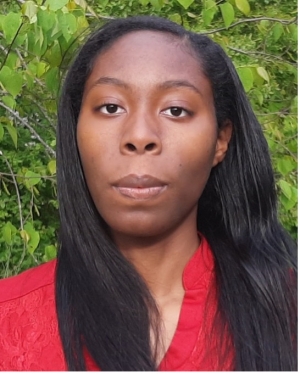
Zemfira, an Octopus, and a Supervillain: Jasmine Alexander-Greene on Putin in World Literature
by Mollie Messick
Monterey Symposium 2021 fellow Jasmine Alexander-Greene’s first exposure to Russian language came during a chance encounter with “Traffic,” a single from famous rock musician Zemfira’s album Fourteen Weeks of Silence. In the years since, Jasmine has not only become a proficient speaker of Russian but has also translated literary works from Russian to English, blogged about Russian literature and politics, and nearly completed her MA thesis in Russian, East European, and Eurasian Studies at Stanford University.
Russian fell outside the standard language offerings at Jasmine’s rural North Carolina high school, so she studied independently using whatever resources she could find. She was able to test into second-year Russian as a freshman at Duke University, where her formal study of the language grew outward to include courses in political science, literature, and literary translation.
In the library at Duke, Jasmine discovered several novels about Vladimir Putin. Her questions surrounding the phenomenon of writers creating fictional depictions of Russia’s leader while he was still in power evolved into a master’s thesis at Stanford on representations of Putin in world literature.
A voracious reader and an avid student of history, Jasmine is aware that depictions of world leaders in literature are nothing new; Russia has a long tradition of writing about leaders, from Ivan the Terrible and False Dmitry to Stalin. The literary portraits of Putin that she studies offer more diverse perspectives and are decentralized, appearing in France, Germany, and the U.S. as well as in Russia and former Soviet republics. “There’s much less top-down control over what gets out,” Jasmine said, citing increased access to publishing and print-on-demand technology.
In a less than ideal political climate, Russian writers whose work satirizes or criticizes the Russian president are choosing to publish in the face of considerable risk. For Jasmine, these post-modern deconstructions of Putin’s administration are the most nuanced and sophisticated of the five categories, or personae, she’s identified in her primary sources (among them, the common Western view of Putin-as-geopolitical-supervillain). Authors such as Sergei Dorenko and Maksim Kononenko – both journalists – mix folklore and comedy with mention of specific political policies under Putin in their novels.
Most interesting of all, however, is Jasmine’s conclusion that although the Russian writers share many objectives with their predecessors who wrote about other Russian political figures – attempting to capture what life is like for Russians under Putin, for example – they are not interested in him as a “great man” of the twenty-first century.
“Putin, in their eyes, is quite derivative,” Jasmine said. “Their works pick him apart – and his television persona apart – to reveal how little substance lies underneath. He’s an amalgam of the people around him and emulates leaders who came before him.” Because these writers see Putin as a composite, Jasmine asserts, they don’t ask questions in their work that assume that he’s unique. “He appears meaningless, ultimately, for the grand scheme of Russian history.”
Jasmine is not yet sure what comes after the completion of her far-reaching project on depictions of Putin in literature, but she knows she’s looking for something that continues to stretch across disciplines.
“I’m kind of like an octopus, with tentacles that are trying to grab onto different subjects, reaching out toward different career pathways,” she said. “I hope that whatever it is, it puts me in contact with Russian language and culture, and preferably also the country itself.”
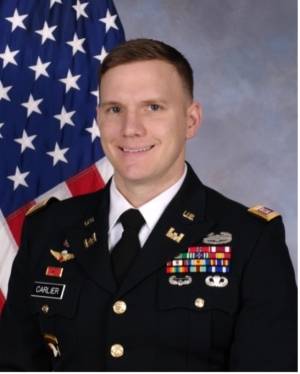
The Building Blocks of International Cooperation: Alex Carlier on Language and Education
by Mollie Messick
For Monterey Symposium 2021 fellow and U.S. Army Major Alex Carlier, becoming a Foreign Area Officer (FAO) is about building relationships across cultures.
Alex decided to join the military after 9/11; before that, he was interested in becoming a game designer. “It was one of those defining moments where I happened to be considering what to do with my life at the same time as a really significant event happened,” he said.
While he was a cadet in the ROTC program at Ohio State University, the military was investing in development projects in Afghanistan and Alex was training to be an engineer officer. A mentor suggested that he pursue the FAO track so he could learn a language.
“[He recognized] that I valued relationship-building perhaps even more than just doing the project management,” Alex explained.
However, Alex first needed to gain several years of military experience. He served as a company commander in Afghanistan. Next, he studied at the Defense Language Institute (DLI) in Monterey, completed an internship at the U.S. Embassy in Tbilisi, Georgia, and started a graduate program in International Policy and Development at the Middlebury Institute of International Studies (MIIS) in Monterey.
“I get to work for an organization that values giving me the time to focus on education, so I’m really grateful to the military for that opportunity,” he said. His MA program at MIIS marks the second graduate degree that the military has supported. Alex also holds an MS in Engineering Management from Missouri University of Science and Technology.
Language continues to play an essential role in Alex’s career. While studying Russian at DLI, he came to appreciate the “simplicity of being so focused on something I already wanted to do, which was to acquire a language.” He and his wife, Katie, took classes in Georgian language through the BUILD program at MIIS before relocating to Tbilisi, and Alex found that despite the language politics at play in Georgia, his ability to use Russian as a common language granted him access to a much wider community.
At MIIS, Alex has been able to continue his language study alongside the development of pragmatic policy skills. Both will serve him in his first assignment as an FAO at the European Command Headquarters in Germany.
“The government has several sub-cultures, so I’ll be communicating between the State Department and the Department of Defense and helping them understand each other better as well. I think there’s an actual cross-cultural aspect to my job between countries, and then there’s one just helping our own government talk to itself. That’s where I’ll exist at every job I go to in the future.”
Until then, Alex is soaking up as much knowledge as he can from the Monterey Symposium and his remaining time at MIIS. After the pressures of managing a company of soldiers in Iraq, he appreciates the opportunity to “learn so much about human security and some very real perspectives that I’m looking forward to being aware of and taking with me to work in the security sector.”
“I like that my job is to be a sponge right now,” he said, though he is also engaging in mock arms control negotiations, analyzing the histories of empires, and learning about the impact of climate change on international policy.
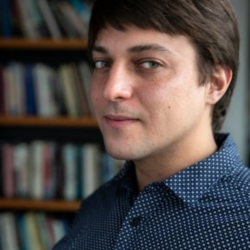
Aron Ouzilevski
Though Monterey Symposium 2019 fellow Aron Ouzilevski spent his childhood summers at the family dacha outside of St. Petersburg, he didn’t know he wanted to research and write about Russia until he was an undergraduate student taking courses in art history and literature.
Through these courses, he realized the strong influence of nineteenth and early twentieth century Russian literature, thought, art, and science on the development of world culture. After college, he moved to Moscow, where he worked as an editorial assistant for the Moscow Times and wrote for an English language media platform, INRUSSIA.com.
Aron applied to the Monterey Symposium after returning to the U.S. to pursue an MA in Global Journalism and Russian and Slavic Studies at NYU. At NYU’s Jordan Center for Advanced Study of Russia, where he worked, he saw an advertisement for the 2019 Monterey Symposium. He was attracted to the diversity of speakers, ranging from “young, contemporary people living in Moscow, doing interesting and innovative media projects, to world-renowned scholars at big-name U.S. universities or UK universities.”
When he arrived in Monterey for the Symposium, Aron found that his cohort also represented diverse areas of interest: “We had PhD scholars who were studying contemporary Russian writers like Boris Akunin and the Moscow conceptualists forging strong relationships with people who go to Johns Hopkins and work on military exchange programs.”
Now, two years out from his Monterey Symposium experience, Aron remembers the “seamlessness of the whole experience” and the ease with which Professor Anna Vassilieva, founder and director of the Monterey Symposium, brought together “so many different minds from so many different fields.” He was able to connect with experts from the contemporary Russian media scene such as Ilya Krasilshchik and Filipp Dzyadko.
Aron recently completed his MA and participated in a remote internship with the Council on Foreign Relations (CFR) through the Blavatnik Internship Program. In addition to learning more about how Russia’s actions have a direct impact on U.S. foreign policy, he worked closely with Monterey Symposium expert Thomas Graham, distinguished fellow at CFR, and with Monterey Symposium 2017 alumnus Joseph Haberman, research associate at CFR.
Taylor Valley
For Monterey Symposium 2017 fellow Taylor Valley, the Monterey Symposium sparked an interest in international negotiations that continues to drive her work and research today.
Taylor has always been passionate about languages; she studied Spanish and French in high school and started learning Russian in college. Her interest in the language naturally evolved into curiosity about what was going on in Russia and eventually led her to the MA program in Russian, Eastern European, and Central Asian Studies at Harvard University, where she heard about the Monterey Symposium and decided to apply.
During the Symposium, Taylor enjoyed the intensive learning environment and the length of time devoted to developing the knowledge and skills of graduate students and professionals just beginning their careers. “I haven’t seen another program that has this kind of focus or intensity,” she said of the Monterey Symposium.
Monterey Symposium experts Bruce Allyn, Cynthia Lazaroff, and William Ury gave a series of presentations about Track II diplomacy and negotiation skills that both inspired Taylor and changed the way she thought about the field: “MSSR was the first time I learned Russian Studies through a skill-based approach.”
Following the 2017 Symposium, Taylor enrolled in a negotiation course at Harvard and now designs and runs negotiations workshops with Russian Studies content with Harvard’s Negotiation Task Force and Monterey Symposium expert Dr. Arvid Bell. Her work in international negotiation also led her to become involved with the Arms Control Negotiations Academy (ACONA) and in 2019, she published an article in the National Interest about the Russo-Venezuelan relationship.
Taylor returned to the Monterey Symposium to teach a negotiations workshop in 2019 and in 2020, she was a Monterey Symposium expert alongside 2017 alumna Hanna Notte and 2018 fellow Ivo Walinga. “I love coming back to do this,” Taylor said of teaching at the Monterey Symposium.
Taylor is currently a PhD student in Political Science at Northeastern University and plans to continue learning and teaching about international relations and negotiation.
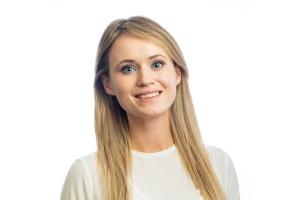
Jade McGlynn
2018 Monterey Symposium fellow Jade McGlynn’s secondary school didn’t offer Russian language courses, so she taught herself from a book.
She was interested in Russian history and literature, especially Dostoevsky, and wanted the unique access that comes with knowing the language: “I realized that Russia is the sort of country where you really need to understand the language if you want to have any hope of understanding the country.”
Jade applied to MSSR after her first year of study toward a PhD at Oxford. Though she had lived and worked in Russia for several years, the Monterey Symposium provided her with a welcome immersion in Russian language. She admired not only the caliber of experts, but also the range of positions they represented.
“You’re still finessing your ideas,” Jade said of her experience as a fellow, “and you learn by developing with people of a similar mindset, but also by being presented with actually really good facts and research that completely challenges you, that you need to work out.”
During the 2018 Symposium, Jade honed her understanding of the differences between British and American perspectives on Russia. She also participated in a negotiations simulation led by Monterey Symposium expert Matthew Rojansky and modeled on the Conference on Security and Cooperation in Europe (CSCE) Helsinki negotiations. This workshop showed Jade what it could look like to be a practitioner in the field and gave her the courage to eventually pursue a career outside of academia.
After the Monterey Symposium, Jade earned her PhD and taught as a member of the faculty of Medieval and Modern Languages at Oxford. This January, she took a job as the head of the Russia and Eurasia Studies Centre at a London-based think tank, the Henry Jackson Society. She has published articles and chapters on Russian political culture and foreign relations and is currently preparing an adaptation of her PhD thesis for publication.
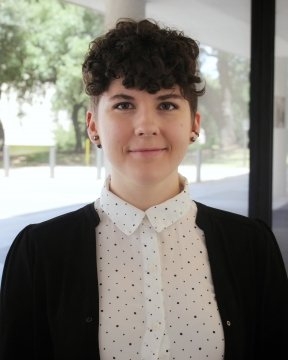
Lera Toropin
After working as a diplomatic assistant at the Japanese Embassy in Washington, DC, MSSR 2020 fellow Lera Toropin knew that she wanted to study international relations. Rather than continuing her studies in Japanese, she decided to work with a language that for her had always been more personal than professional: Russian.
Lera is a heritage speaker of Russian who was born in Moldova and came to the United States as a child. When last year’s Symposium began, she had just finished her first year in a dual MA program in Global Policy Studies and Russian, East European, and Eurasian Studies at the University of Texas at Austin.
Lera encountered Track II diplomacy for the first time at the Symposium and felt that she had found a new purpose, “something to aim for.” Monterey Symposium experts Lyndon Allin, Matthew Rojansky, Olesya Vartanyan, Roxana Christescu, and Hanna Notte presented on Track II dialogue, an aspect of international relations which doesn’t receive focused attention in Lera’s master’s program.
The opportunity to hear from Russian experts was another highlight of the Monterey Symposium. “It’s such a privilege to hear from these people because it’s hard to connect with them, typically, at American universities,” Lera said of Monterey Symposium experts such as Dmitri Trenin and Vladimir Pozner.
“It was absolutely invaluable to push past the typical bias we get from consuming information about Russia through American sources.”
Lera enjoyed developing new podcasting skills with Monterey Symposium expert Sean Guillory, host of the SRB Podcast. She’s currently using these skills as the cohost and associate producer of the Slavic Connexion, a student-run podcast supported by the Center for Russian, East European, and Eurasian Studies (CREEES) at the University of Texas at Austin.
She also appreciated how Monterey Symposium experts expressed uncertainty and identified questions in the field that remain unanswered. As a graduate student and a professional coming into the field, she saw potential areas of focus for her research. “There’s still more work to do,” she said.
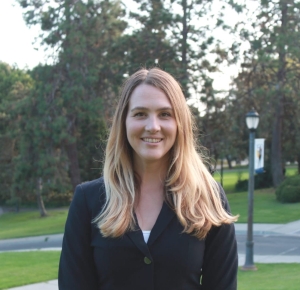
Melissa Samarin
Melissa Samarin (Monterey Symposium 2017) had just started her PhD program in Political Science when Russia began to reemerge in U.S. mainstream media in the fall of 2016. The following summer, she joined the first cohort of fellows for the Monterey Summer Symposium on Russia.
Melissa had been out of academia for several years prior to enrolling at the University of California Berkeley, and she was excited about the opportunity to re-immerse herself in the Russian language and to catch up on what was happening in the field.
Once the 2017 Symposium was underway, she enjoyed connecting with experts and advanced graduate students and compared the Symposium to a board meeting: “We had all of these people from different fields, different disciplines, but we all have this unifying interest in modern Russia, so in a way it was like the meeting of the minds.”
Though art history is not her specialty, Melissa still goes back to her notes on MSSR expert Natalia Sevagina’s presentations. She reconnected with Natalia Sevagina in Moscow during a tour of the Tretyakov Gallery, where Sevagina is a specialist in research and education.
Melissa has also crossed paths with Monterey Symposium expert Matthew Rojansky, whose interactive presentations on U.S.-Russia relations left a strong impression on her: “I remember sitting there thinking, ‘I want to do that, that’s exactly the job that I want!’”
Since the Monterey Symposium, Melissa has finished her PhD coursework and is working to complete her dissertation. Last spring, she taught international relations at the Higher School of Economics in Moscow through the Alfa Fellowship Program before the semester was interrupted by COVID-19. She enjoys teaching and conducting research and plans to apply for professorships once she receives her PhD.
She has remained close with several other fellows from the 2017 cohort and has worked with Professor Anna Vassilieva, founder and director of MSSR, on Track II diplomacy issues.
The Monterey Symposium “opened up so many channels for me personally and professionally,” Melissa said. “It is what you make of it, and I made the best of it.”
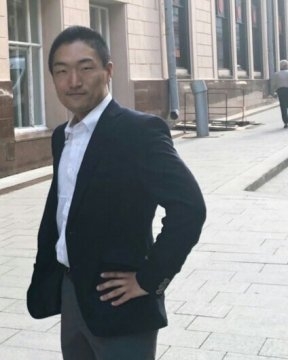
Tomohito Ishikawa
Monterey Symposium 2020 fellow Tomohito Ishikawa decided to pursue a career in diplomacy after he left Japan to study abroad in Canada. As a student in Toronto, he got to know people from all over the world and observed the ethnic and political tensions of nations playing out on a smaller, human scale.
“I wanted to do something to improve that situation, solve that situation,” Tomohito said. “My simple answer was to become a diplomat and somehow contribute to world peace.”
He returned to Japan to earn a master’s degree in Sociology at Hitotsubashi University and started working for the Ministry of Foreign Affairs of Japan. He completed two years of intensive Russian language training in Moscow before participating in the Monterey Symposium.
The Monterey Symposium deepened Tomohito’s understanding of Russia and challenged his thinking about diplomacy. “When I study by myself, I tend to focus on very narrow, short-sighted kind of topics, but by participating in the Symposium I could broaden my ideas,” he said.
When Ambassador John Beyrle recounted a story about organizing a formal event at Spaso House with a “Master and Margarita” theme, Tomohito was inspired. He came away from the presentation eager to explore new possibilities for cultural exchange and diplomacy in Russia.
Monterey Symposium expert Andrei Tsygankov of San Francisco State University also made a strong impression on Tomohito. Tsygankov discussed the significance of increased citations of the work of Nikolai Danilevsky in Russian foreign policy circles and reminded fellows to consider the underlying core values of the Russian people.
Tomohito asked Monterey Symposium expert Steven Kotkin of Princeton University about the role of a historian, and Kotkin warned about the dangers of overly simple historical analogies and the historian’s role in avoiding them. “Reality is much more complex and difficult,” Tomohito said.
This fall, Tomohito moved to Monterey to study English and to continue his study of Russian and International Relations. Then he will start working at a Japanese embassy. He plans to continue studying Russian culture and language, possibly at the PhD level, and hopes to find ways to share contemporary Russian culture with the younger generation in Japan.
Alexandra Diouk
From the opening lectures by Monterey Symposium expert Andrei Tsygankov, Alexandra Diouk (Monterey Symposium 2020) appreciated the Symposium’s commitment to honor Russia’s complexity, create a positive intellectual atmosphere, and focus on the human element in relations between Russia and the West.
During her undergraduate studies in International Relations, Alexandra often saw prescriptive and oversimplified views toward Russia, and she was inspired by MSSR’s assertion of an equal playing field. “There was no moralizing, no implicit understanding that what we’re trying to do is get Russia up to our level, or understand this strange, othered place,” she said of the Symposium.
This profound respect extended to fellows as well. The structure of the Monterey Symposium encourages Russian-speaking experts to lecture in Russian, and Alexandra appreciated that fellows were treated as capable of understanding advanced professional presentations in Russian.
The “hands-on” components of the Monterey Symposium – the Harvard Negotiations Bootcamp and the Track II dialogue panel – were practical and interactive, giving Alexandra an opportunity to consider applications of her skillset and to bond with other fellows as they worked together on tasks.
Alexandra was especially drawn to “hearing people talk about people” and the experts such as Joshua Yaffa and Keith Gessen who focused on human-level connection and storytelling. “That was really what touched me, this connection between people from different places,” she said. “There’s a lot of differences and cultural dissimilarities, but at the same time that’s really what we’re all doing this for.”
Alexandra’s own research for her master’s thesis at St. Antony’s College, Oxford, grew out of an interest in human-level connection and focuses on differences between immigrant and convert Russian Orthodox communities outside of Russia through the lens of COVID-19 recommendations and practices.
She will complete her degree in June 2021 and hopes to return to Russia to immerse herself in Russian culture and language and continue her research. For Alexandra, the Monterey Symposium was not about solving a problem or networking like business partners, but about fostering connections between people who care deeply about Russia and Eurasia. “It’s very much a family atmosphere,” she said.

Hanna Notte
Hanna Notte (Monterey Symposium 2017) trained as a classical violinist, and her decision to learn Russian grew from a passion for the music of Tchaikovsky, Rachmaninoff and Shostakovich.
Though she studied political science at university, she didn’t focus on Russian politics until she began her master’s studies at the University of Oxford. “Suddenly years of investment in the language paid off,” she said. “It was clear that Russia would be part of my career over the long term.”
In 2015, during her PhD studies at Oxford, Hanna lived in Moscow to conduct research at the Carnegie Moscow Center and the Institute of Oriental Studies through the Alfa Fellowship Program. That September, Russia sent troops to intervene in the Syrian civil war, and Hanna watched the situation unfold from Moscow.
When she applied to the Monterey Symposium, Hanna had just started consulting for the Shaikh Group, a nonprofit focused on Track II diplomacy in the Middle East and North Africa, and she found the Symposium “tremendously useful.”
It’s not possible to learn everything you need to know about Russia in one eight-week course, she said, “but it can point you toward everything that you should learn, that you should pay attention to, that I’m still doing today to understand Russia better.”
Hanna attended transformative lectures by Monterey Symposium experts Andrei Tsygankov and Natalia Zubarevich, but it was her introduction to issues of arms control and nonproliferation at the presentations of MSSR expert and James Martin Center for Nonproliferation Studies (CNS) founding director William Potter that reshaped the direction of her career.
“If I hadn’t had that exposure at the time and then started to become more interested in that, I probably would not be where I am today,” Hanna said of Potter’s lectures.
In the years since she first attended the Monterey Symposium, Hanna worked as a senior political officer for the Shaikh Group and led all of the group’s outreach to Russia. At the end of 2020, Hanna joined Dr. Potter as a senior nonresident scholar at CNS. There, she has begun to broaden her focus to include not just Russian relations with the Arab world, but also Russia-West relations, especially on security, arms control and nonproliferation issues.
This summer will mark Hanna’s fourth year teaching at the Monterey Symposium as an expert on Russian foreign policy in the Middle East. She enjoys working with fellows who “fundamentally wish for better relations between the West and Russia,” a position that also underpins the Symposium. She has also been a guest lecturer at the Higher School of Economics in Moscow and the American University in Paris.
MSSR fostered academic and professional ties for Hanna, and she has kept close contact with the 2017 cohort. She was recently invited with Melissa Samarin (MSSR 2017) to join the “Valdai 2030” project, a network of young experts on Russia.
In addition to her new position at CNS, Hanna has recently published articles with the National Interest, Foreign Policy and Carnegie Russia, and she is currently working on a book manuscript that builds on her experience as an expert on Russian foreign policy in the Middle East.
